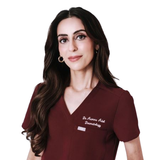
2nd October, 2025
Caffeine in Hair Care: Energising Your Scalp for Growth
Written by: Dr Smrithi Santhosh | Reviewed by: Dr Aamna Adel

Written by
Dr Smrithi Santhosh
Dermatology Registrar
Content Writer/Editor

Reviewed by
Dr Aamna Adel
Consultant dermatologist
Chief editor/writer
In This Article
You’ll likely already know the benefits of caffeine. For one, it can increase alertness, but it can also improve cognitive function and even enhance physical performance. But what if we told you that your favourite morning pick-me-up might also stimulate hair growth when applied directly to your scalp?
Well, you’d probably be tempted to start pouring your mocha lattes over your head, but fortunately for you - there are easier ways to enrich your hair with caffeine, such as using a specific hair serum or shampoo.
If you’re interested in finding out the science behind whether caffeine is good for hair growth - read on to discover all the information you need, laid out by medical experts…
How Does Caffeine Help With Hair Growth?
By Having a Cellular Impact
Lab research conducted on human hair follicles shows that caffeine can have a cellular impact to help grow your locks. One key mechanism is by blocking a hormone called DHT. DHT blockers are linked to hair loss, so keeping them in check can support healthier hair.

By Stimulating Hair Follicles
Research suggests caffeine can encourage the cells in hair follicles to multiply, which could promote the development of more active follicles and increase hair growth potential. Caffeine also appears to widen the tiny blood vessels in the scalp and boost microcirculation, which means more oxygen and nutrients are delivered to hair follicles - aka another win for hair growth.
By Acting as an Antioxidant
Caffeine also acts as an antioxidant, helping to protect hair follicles from damage caused by everyday stressors such as pollution and UV exposure. When the scalp experiences oxidative stress, hair growth can slow, or hair loss may be triggered. By reducing this damage, caffeine may help create a healthier environment for hair to thrive.
Caffeine vs Minoxidil
So how does caffeine compare to minoxidil, the current gold standard treatment for pattern hair loss? While minoxidil has decades of clinical data supporting its efficacy, caffeine is now building its evidence base, and recent studies are recognising its potential.
Study One
A systematic review published in February 2025 analysed multiple clinical trials on the use of topical caffeine preparations for hair loss. It highlighted that caffeine can stimulate cell growth and effectively penetrate hair follicles, suggesting it may be a safe and promising agent against hair loss.
Study Two
Another study looked at 210 men with androgenetic alopecia who were treated with either a 0.2% caffeine-based topical liquid or a 5% minoxidil solution over six months. The results indicated that the caffeine solution was not inferior to minoxidil in terms of effectiveness, producing comparable improvements in hair growth and a similar increase in the number of hairs in the growth (anagen) phase.

Is Caffeine Shampoo Good For Hair?
Admittedly, the science is exciting. While caffeine may not be a standalone solution, it could still be a valuable addition to your hair care routine. A review article published in the Journal of the American Academy of Dermatology collates data from multiple studies, acknowledging that the evidence is still emerging, and suggests that caffeine shows promise as a supportive ingredient in hair care products. Let’s dive into some research that reveals just how good caffeine shampoo is for hair:
Study one: You’ve probably seen caffeine shampoos on store shelves, such as Alpecin, amongst others. A study examining men with early-stage male pattern baldness found that using a caffeine shampoo for just two minutes daily led to stronger, less brittle hair. Most users also found it gentle on their scalp, with virtually no irritation.
Study two: More recently, in September 2024, another trial tested a shampoo that combined caffeine with a protein called adenosine. After daily use, participants had an improvement in hair density.
Study three: In a separate trial, researchers combined caffeine with dimethylglycine sodium salt (DMG-Na) into a shampoo and compared it to a placebo in 154 men. Men using the active shampoo experienced less hair shedding by six months, along with thicker hair and an increase in the number of strands in the growth (anagen) phase. And the best part? Side effects were minimal.
The Final Verdict
Caffeine scalp treatments may not replace medically proven options, such as finasteride or minoxidil, but it is a powerful ingredient, backed by growing clinical evidence.
Adding caffeine to your routine is a safe way to help reduce shedding and support overall scalp health. It might just be the wake-up call your scalp’s been waiting for! And as always, if you’re unsure or have concerns about hair loss, it’s a great idea to check in with your local dermatologist.
For more information on the latest in hair health and the science behind recent trends, check out our blog.
References
- Fischer TW, Hipler UC, Elsner P. Effect of caffeine and testosterone on the proliferation of human hair follicles in vitro. International Journal of Dermatology. 2007 Jan;46(1):27–35.
- Bansal M, Manchanda K, Pandey SS. Role of Caffeine in the Management of Androgenetic Alopecia. International Journal of Trichology [Internet]. 2012;4(3):185–6. Available from: https://www.ncbi.nlm.nih.gov/pmc/articles/PMC3500065/
- Ewelina Szendzielorz, Spiewak R. Caffeine as an Active Molecule in Cosmetic Products for Hair Loss: Its Mechanisms of Action in the Context of Hair Physiology and Pathology. Molecules. 2025 Jan 4;30(1):167–7.
- Ewelina Szendzielorz, Spiewak R. Caffeine as an Active Ingredient in Cosmetic Preparations Against Hair Loss: A Systematic Review of Available Clinical Evidence. Healthcare. 2025 Feb 12;13(4):395–5.
- Dhurat R, Chitallia J, May TW, Jayaraaman AM, Madhukara J, Anandan S, et al. An Open-Label Randomized Multicenter Study Assessing the Noninferiority of a Caffeine-Based Topical Liquid 0.2% versus Minoxidil 5% Solution in Male Androgenetic Alopecia. Skin Pharmacology and Physiology [Internet]. 2017;30(6):298–305. Available from: https://www.ncbi.nlm.nih.gov/pmc/articles/PMC5804833/
- Ly N, Paiewonsky B, Fruechte O, Hordinsky S, Farah R, et al. Caffeine supplementation to improve hair growth: a systematic review. J Am Acad Dermatol. 2023 Sep;89(3):AB131. Available from: https://www.jaad.org/article/S0190-9622(23)01884-4/fulltext
- C. Bussoleffi, Mastropietro F, Tolaini MV, L. Celleno. Use of a Caffeine Shampoo for the Treatment of Male Androgenetic Alopecia [Internet]. Journal of applied cosmetology. 2018 [cited 2025 Aug 12]. Available from: https://www.semanticscholar.org/paper/Use-of-a-Caffeine-Shampoo-for-the-Treatment-of-Male-Bussoleffi-Mastropietro/42fe0d88ef355e2d4c5db109ebae6fac67b23bf7
- Chen D, Yu F, Wang C, Chen H, Tan J, Shi Q, et al. Anti‐hair loss effect of a shampoo containing caffeine and adenosine. Journal of Cosmetic Dermatology. 2024 May 19;23(9):2927–33.
Celleno L, Bussoletti C, Tolaini MV, Rossi A, Ala L, Becker M, et al. A Novel Approach Against Male Pattern Hair Loss With Topical Dimethylglycine Sodium Salt (DMG‐Na) and Caffeine: Efficacy of a 24‐Week, Double‐Blind, Randomized, Placebo‐Controlled Trial. Journal of Cosmetic Dermatology [Internet]. 2025 Aug [cited 2025 Sep 13];24(8). Available from: https://www.hcplive.com/view/dimethylglycine-sodium-salt-caffeine-shampoo-effective-androgenetic-alopecia



